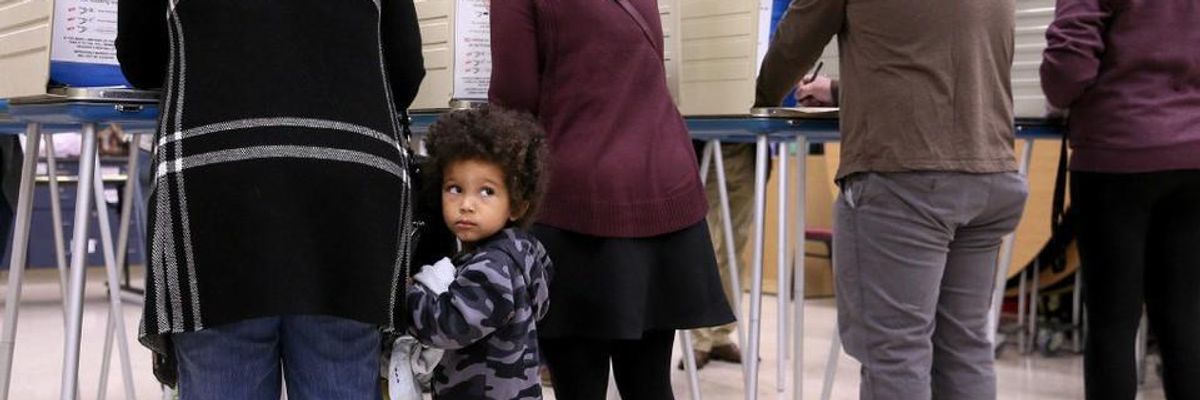Throughout our history, the country has marched toward a more perfect union by expanding access to the ballot. That progress has helped enshrine our core values of justice, fairness and inclusivity, and slowly strengthened America's foundation.
The first eight months of the Trump administration have shaken that foundation.
President Donald Trump's bogus assertion that millions of people voted illegally has been widely debunked.
The sham commission he created to validate this absurd claim has already suppressed voting. Its attempt to create a national database through its unprecedented request for personal voter information, such as partial Social Security numbers and party affiliation, led thousands of voters to cancel their registrations.
Election officials from both parties rejected and condemned the commission's unprecedented overreach.
Election officials from both parties rejected and condemned the commission's unprecedented overreach.
But the commission's membership revealed its true agenda. Kansas Secretary of State Kris Kobach, Hans von Spakovsky, and several other Republican commissioners, including former Ohio Secretary of State Ken Blackwell, have devoted their careers to voter suppression.
On the very same day of the commission's data request, the Trump Justice Department sent a separate letter to 44 states demanding that they provide extensive voter information in what appears to be a prelude to voter purges.
Now, the Trump Justice Department is at it again, with its brief in the Ohio voting rights case Husted v. A. Philip Randolph Institute, to be argued before the U.S. Supreme Court on Nov. 8.
This case is about whether the National Voter Registration Act, or NVRA, prevents the state of Ohio from continuing to try and purge voters from its rolls. Congress passed the NVRA in 1993 to make it easier for voters to register at their local motor vehicle bureaus and other government agencies. Among other steps to increase election participation, the law required states to maintain accurate voter rolls and ensure that voters are not improperly purged. Three different administrations from both parties have enforced the law by fighting efforts to illegally remove voters if they choose not to vote.
However, that has not stopped a few states - most notably Ohio - from breaking the law. And they now have an unlikely ally in the Trump Justice Department, which reversed longstanding DOJ legal interpretation to pursue its extreme agenda.
Several years ago, Ohio began what is known as a "Supplemental Process" to purge eligible voters from the rolls if they did not vote over a two-year period, even if they had not moved. In 2015 alone, Ohio purged thousands of voters. At the time, the U.S. Department of Justice argued that this was a clear violation of the NVRA.
In the Husted case, a federal appeals court agreed with the Justice Department (DOJ) that Ohio violated the NVRA; the ruling allowed many previously purged voters to cast a ballot in 2016.
Ohio appealed the ruling, and in a troubling about-face, the Trump Justice Department reversed its earlier opposition to Ohio's actions and decided to support the state's continued efforts to purge voters.
The Leadership Conference on Civil and Human Rights proudly joined the NAACP Legal Defense and Educational Fund in submitting a "friend of the court" brief, arguing that the Supreme Court should be skeptical of DOJ's new position, particularly given the length of time DOJ had opposed purge practices like Ohio's.
The sudden shift in a longstanding position because of a change in political administrations validated the worst fears about the Trump administration.
It also raises real concerns about the politicization of the Justice Department's historic role in protecting voting rights for all eligible voters. It could also have real consequences for the rights of thousands of Ohioans, and ultimately millions of Americans, to exercise their right to vote.
Ohio is not the only state that has recently tried to restrict voting rights through voter purges. Earlier this year, more than 380,000 Georgians received a "purge notice" at the direction of the Georgia Secretary of State.
We all have a responsibility to use the recent voter-purge efforts to remind people that they must mobilize and participate in our elections. Voter participation is far too low in many states, but there are clear steps we can take to increase citizen participation. These include expanding the opportunity to vote early and removing obstacles that make it harder to vote, like photo ID requirements.
We should follow the lead of states like California, Illinois, and Rhode Island and create automatic voter registration systems so people do not have to jump through hoops just to cast a ballot. And we must urge members of Congress to do their job and fully restore the Voting Rights Act, which was gutted by five Justices in a 2013 Supreme Court decision.
The right to vote is the most fundamental right we have, and greater participation only makes our democracy stronger. The Supreme Court must safeguard this sacred right by striking down the illegal Ohio voter purge law, which clearly violates the NVRA. Our democracy is depending on it.

